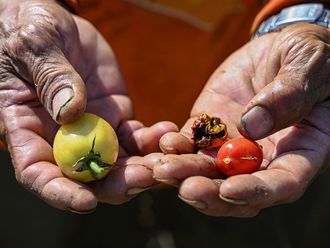Manila: The Philippine army chief yesterday ruled out peace talks with communist rebels.
Lieutenant-General Hermogenes Esperon said the military was ready to do battle with New People's Army (NPA) guerrillas and was also focusing on development work in poor rural villages to check the expansion of rebel influence.
"We'll fight them and the plans are laid out," Esperon, commander of the 70,000-member ground forces, said in an interview at an army fortress near Manila's business district.
"The president has decided that we do not go on peace talks with them. They take advantage of the democratic space. They take advantage of the security and immunity guarantees. They roam and propagandise, arouse, organise and mobilise."
The Philippines estimates the NPA membership at 7,000, down from a peak of more than 25,000 in the mid-1980s.
The insurgency, which has killed about 40,000 people, is active in 69 of 79 provinces and has stunted rural development by terrorising villages and businesses with violence and "revolutionary war taxes'.
"The talks will not give us anything," said Esperon, adding the military was supporting Malaysian-brokered peace negotiations now in progress with the largest Muslim rebel group, the Moro Islamic Liberation Front (MILF).
Esperson said he was more confident a peace deal would be signed with Islamist rebels, reducing threats from separatist guerrillas and other militant groups with ties to Al Qaida and its Southeast Asian franchise, Jemaah Islamiah.
"The matter of secession is not so much a problem," said the seasoned intelligence and combat officer.
Last October, the government of President Gloria Arroyo revoked the immunity that had applied to about 100 communist members engaged in peace negotiations, more than a year after Norwegian-brokered talks were suspended.
Communist leaders said they would not return to negotiations unless Manila agreed to help persuade the United States and some European governments to remove them from lists of terror groups.
Apart from stepping up offensives against rebels, including the recruitment of 7,000 extra troops this year, Esperon said army engineers were focusing on 500 impoverished villages across the country to build roads, schools and artesian wells.
"That's not exactly the job of the military," he said, adding the army would take part in development activities to check the expansion of rebel influence from the countryside.
Esperon said the government was spending 5 billion pesos (Dh348 million) of its 35 billion pesos in savings last year to bring development to remote villages with a known rebel presence.
The military was alarmed by rising NPA violence during the last four months of 2005, he said, adding soldiers had been distracted by a political crisis spawned by allegations against Arroyo of election fraud and corruption.
Reviewing photographs taken during political protests in Manila last year, Esperon said the army learned NPA rebels had infiltrated the crowd and may have brought in "armed members".












